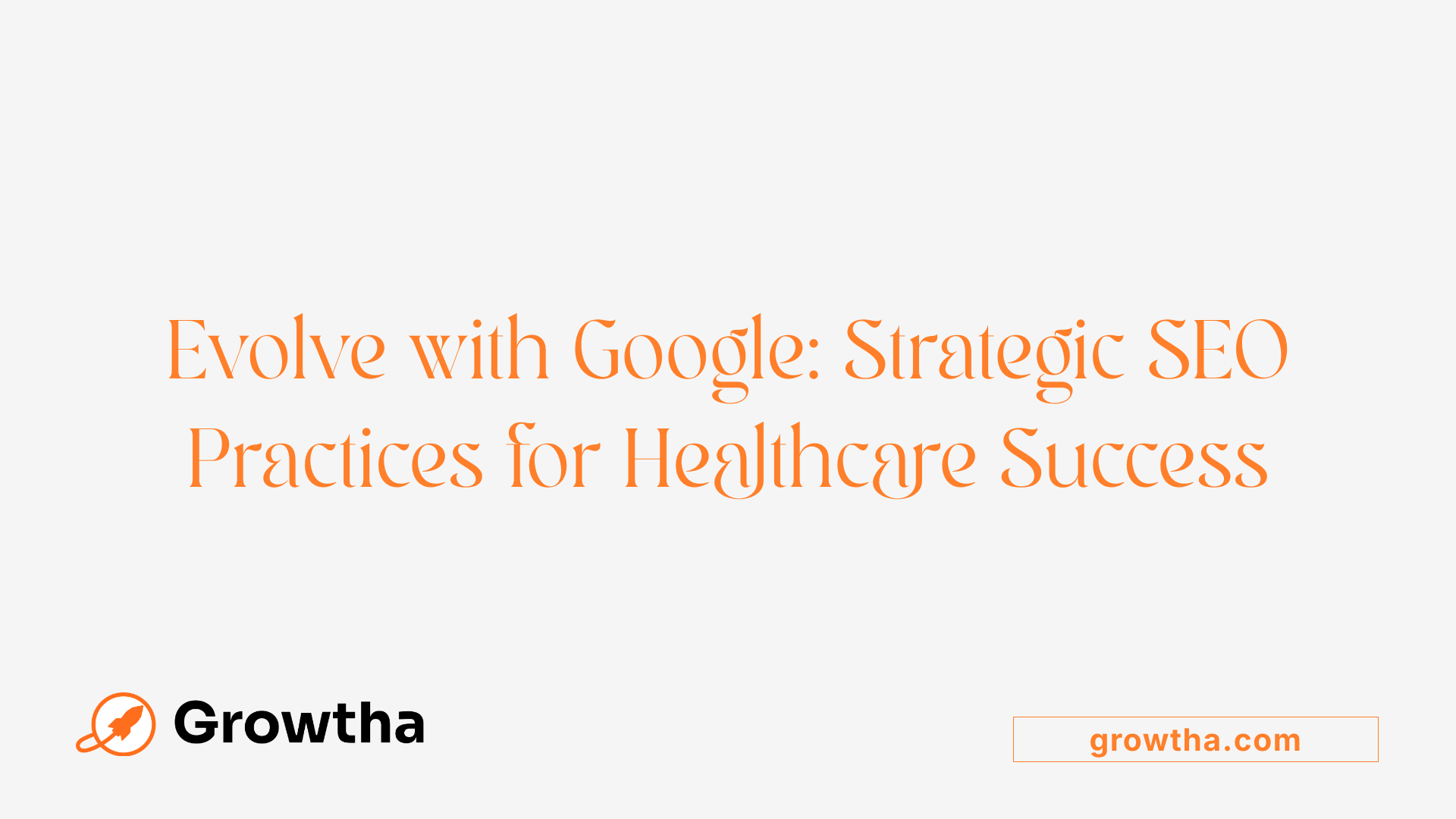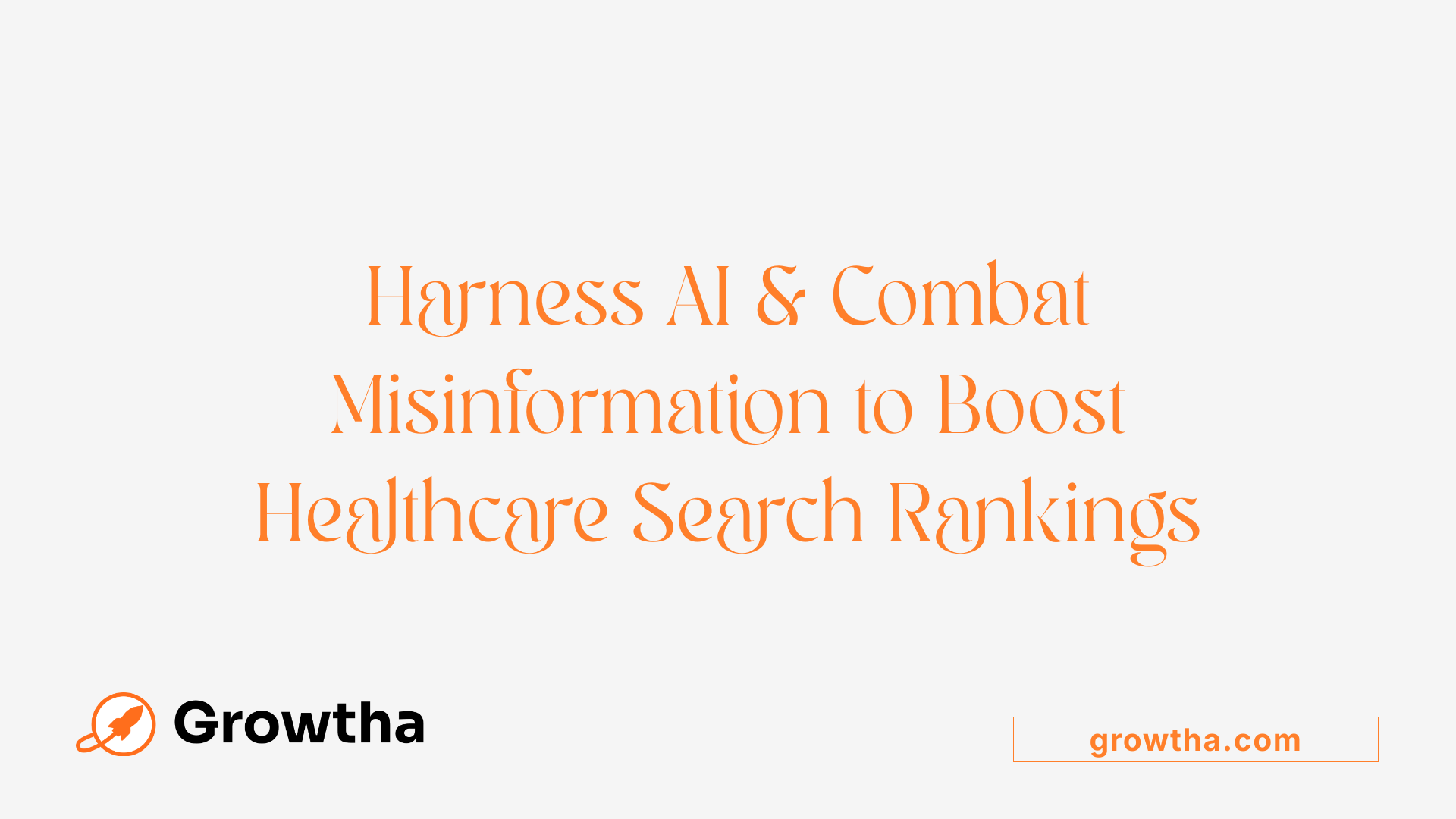The Impact of Google Algorithm Updates on Healthcare SEO
How Google's Evolving Algorithms Shape Healthcare Search Dynamics


The Impact of Google Algorithm Updates on Healthcare SEO
Understanding the Shifts in Healthcare SEO Driven by Google Updates
In the rapidly changing landscape of digital healthcare marketing, staying ahead of Google's algorithm updates is crucial for maintaining visibility, trustworthiness, and authoritative presence. Over recent years, Google has introduced numerous updates that significantly influence how healthcare content ranks, impacting everything from SEO strategies to content quality. This article explores the core impacts of these updates on healthcare SEO, emphasizing best practices, evolving ranking factors, and innovative strategies to adapt effectively.
The Core Principles Behind Google’s Healthcare Algorithm Changes
What are best practices and current trends for maintaining or improving healthcare website SEO amid algorithm changes?
Navigating Google’s evolving algorithm landscape requires healthcare providers to focus on creating trustworthy, patient-centered content. Following the E-A-T (Experience, Expertise, Authority, Trustworthiness) and EEAT principles ensures that content is credible, well-sourced, and authored by qualified professionals.
High-quality content that directly answers patient questions and offers valuable information is essential. Regularly reviewing and updating existing articles with the latest medical guidelines and reputable sources, like WHO or CDC, boosts credibility and relevancy.
Technical SEO must not be overlooked. Websites should load quickly, be mobile-responsive, and utilize HTTPS for security. Proper indexing with structured data and schema markup helps search engines understand medical content better, increasing the chances of appearing in rich snippets and AI Overviews.
With the rise of AI and voice search, incorporating long-tail keywords, FAQs, and conversational language can improve visibility in these channels. Local SEO strategies such as claiming Google My Business listings, maintaining consistent NAP (Name, Address, Phone) data, and gathering patient reviews help attract nearby patients.
Avoid black-hat tactics like keyword stuffing or cloaking, which can lead to penalties. Instead, focus on ethical SEO practices aligned with Google’s quality standards.
Tracking performance with Google Analytics, Search Console, and Core Web Vitals enables ongoing assessment. Metrics like organic traffic, keyword rankings, bounce rates, and conversion actions provide insights into what strategies work.
In summary, a balanced approach combining authoritative, well-structured content with solid technical and local SEO practices, coupled with continuous updates and ethical strategies, is key to maintaining or improving search rankings amid ongoing algorithm updates.
Impact of Recent Google Algorithm Updates on Healthcare Content Quality

How do Google algorithm updates influence healthcare content quality, trustworthiness, and ranking factors?
Google's frequent algorithm updates have a significant impact on the quality, trustworthiness, and ranking of healthcare websites. These updates emphasize the importance of high standards like EEAT—Experience, Expertise, Authoritativeness, and Trustworthiness—to help content stand out in search results.
The Helpful Content Update, launched in August 2022, specifically targets low-quality, superficial, or keyword-stuffed content. For healthcare sites, this means creating original, well-researched, and patient-focused information that truly answers user questions. Content that relies heavily on AI without proper human oversight is deprioritized because it often lacks depth and credibility.
In 2023, Google’s core updates, including those in March and later in 2024, further sharpened the focus on content relevance and originality. They reward sites that update their older content, cite reputable sources like WHO or CDC, and showcase expert credentials through bios and author profiles. For YMYL pages, which include healthcare topics, demonstrating expertise and trustworthiness is more critical than ever.
AI-generated content, while useful for quick summaries, can pose challenges for trustworthiness. Google’s AI Overviews pull information from authoritative sources but favor content structured for clarity, accuracy, and relevance. Healthcare providers must optimize content to be both user-friendly and compliant with Google’s standards, balancing automation with human expertise.
Overall, these updates mean healthcare providers need to continually review and enhance their website content. Adopting best practices in technical SEO, regular content updates, backlink quality, and transparency ensures better visibility and maintains user trust. Practitioners who align their strategy with evolving Google algorithms will be better positioned to reach patients effectively and uphold high standards of medical information sharing.
Why Google’s algorithm changes matter for healthcare websites
Altering search rankings and visibility, these updates directly affect a healthcare provider’s online reputation and patient acquisition efforts. Ensuring content is authoritative, thoroughly researched, and regularly refreshed is essential for maintaining a competitive edge amid fluctuating search landscapes.
Strategies for Adapting Healthcare SEO to Google's Evolving Landscape

How can healthcare website owners monitor, diagnose, and respond to the effects of Google algorithm updates?
Healthcare website owners need a vigilant approach to tracking and responding to Google's frequent algorithm changes. They should utilize tools like Google Analytics and Search Console to monitor traffic, keyword rankings, and user engagement metrics. Specialized tools such as SeerSignals can help detect ranking volatility and identify patterns associated with specific updates.
Regular content audits are essential to assess if their pages meet Google’s quality standards, emphasizing high expertise, authority, and trustworthiness—especially important for health-related content classified as YMYL.
During updates, fluctuations in search rankings and visibility often serve as clues. Noticing increased volatility or declines can indicate an update's impact. Diagnosing the cause involves reviewing content quality, technical setup, backlinks, and user signals.
To adapt, healthcare website owners should enhance content by focusing on authoritative sources, updating outdated information, and improving technical SEO by ensuring fast load times and mobile friendliness. Building trust through transparent author credentials and accurate references (like CDC or WHO) is also vital. Continual monitoring coupled with strategic content enhancement and technical improvements ensures resilience against algorithm shifts.
How can healthcare providers and website owners adapt their SEO strategies to changing Google algorithms?
Adapting to Google’s evolving algorithms requires a proactive, comprehensive SEO approach. Healthcare providers should prioritize creating authoritative, patient-centered content that follows EEAT principles. Incorporating expert author bios, citing reputable sources, and ensuring content is medically reviewed enhances credibility.
User-generated reviews, testimonials, and community engagement signals can strengthen authority, especially since Google values genuine feedback and social proof.
Technical SEO is equally important. Ensuring structured data schema, optimizing site speed, and delivering mobile-responsive, accessible websites boost performance and compliance. Staying updated on trends like AI Overviews involves making content concise, factual, and easy to understand, increasing chances of inclusion in AI summaries.
Enhancing local SEO through Google My Business optimization, consistent NAP (Name, Address, Phone Number) details, and local citations attract nearby patients. Monitoring performance metrics like organic traffic, click-through rates, and conversion rates allows practitioners to measure success and adjust strategies accordingly.
By combining high-quality content with robust technical practices and local tactics, healthcare providers can maintain visibility and trust, even as Google’s algorithms continue to evolve.
The Role of AI and Misinformation Control in Healthcare Search Rankings

How does AI filtering influence healthcare content credibility?
Artificial intelligence (AI) plays an increasingly central role in shaping healthcare search rankings by evaluating and filtering content for credibility. Google's AI algorithms analyze the semantics, structure, and sources of health-related content to identify authoritative information. Content that demonstrates expertise, is well-sourced, and clearly addresses user intent is favored for features like AI Overviews.
However, AI filtering also involves balancing the dissemination of reliable health information while minimizing the spread of misinformation. For instance, AI systems prioritize content backed by credible sources such as WHO or CDC, aiming to elevate trustworthy sources in search results. This vigilance helps ensure users receive accurate, current, and relevant health advice.
What are the risks of misinformation in healthcare, and what measures are in place?
The proliferation of misinformation poses significant risks, especially during public health crises like COVID-19, where false claims can endanger lives. Misinformation may include misleading treatment advice, unverified cures, or conspiracy theories that undermine public trust.
To combat this, Google and other platforms employ multiple measures. These include partnerships with reputed health institutions, AI-based detection of false content, and the promotion of authoritative panels in search results. Google's policies also enforce the removal or demotion of misleading health content and emphasize fact-checking.
Despite these efforts, inconsistent safeguards mean that some misinformation still circulates, partly due to the volume of content and the challenge in perfect AI detection. Continuous updates to algorithms and collaborative fact-checking are necessary to reduce the impact of false health claims.
How does AI influence ranking signals in healthcare search?
AI significantly impacts ranking signals by assessing content quality, relevance, and trustworthiness through semantic understanding and vector embeddings. This allows Google to prioritize pages that are clear, factual, and authoritative.
Content optimized for AI recognition — such as well-organized, concise, and sourced articles — has a higher chance of appearing in AI Overviews and top search positions. Conversely, content that relies heavily on keyword stuffing or presents superficial information tends to be deprioritized.
While AI’s influence is substantial, traditional SEO practices remain vital. High-quality backlinks, local optimization, and technical health of a website still underpin overall rankings, especially for bottom-funnel queries like “local eye doctor.”
| Aspect | AI's Role | Impact on Rankings | Focus For Healthcare Providers |
|---|---|---|---|
| Content Evaluation | Analyzes semantics, sources, structure | Prioritizes credible, well-structured content | Use authoritative references and clear structure |
| Misinformation Detection | Flags false or misleading info | Demotes or removes unreliable content | Regular content review and fact-checking |
| User Queries | Provides concise summaries | Affects visibility in AI Overviews | Optimize content for clarity and accuracy |
In summary, AI is reshaping how healthcare content is evaluated and ranked, emphasizing transparency, accuracy, and trust. Providers must adapt by creating authoritative, user-centered content aligned with Google’s evolving standards.
The Significance of Technical SEO and Structured Data for Healthcare Websites

What technical SEO practices are crucial for healthcare website success amid algorithm updates?
In the ever-evolving landscape of search engine algorithms, technical SEO forms the backbone of a successful healthcare website. It involves optimizing the website’s core technical elements to ensure search engines can easily crawl, interpret, and rank the content.
One of the most important practices is ensuring fast site speed. This can be achieved by compressing images, leveraging browser caching, and minimizing code to reduce load times. A quick-loading website enhances user experience, encourages longer visits, and is favored by search engines.
Mobile responsiveness is equally vital. Google’s mobile-first indexing means that the mobile version of a site determines its search ranking. Healthcare websites must be designed to adapt seamlessly to various devices, providing an accessible and user-friendly interface.
Structured data and schema markup play a critical role in helping search engines understand complex healthcare content. By implementing schema for medical conditions, procedures, and professional credentials, websites can appear more prominently in search results with rich snippets, knowledge panels, and other enhanced features.
Security is non-negotiable, especially for healthcare sites handling sensitive patient data. Using HTTPS ensures data encryption and builds trust with visitors. Regular security audits prevent vulnerabilities.
Accessibility should also be prioritized to serve all users, including those with disabilities. This involves using proper contrast ratios, alt texts for images, and navigable interfaces.
Maintaining technical health through regular audits, fixing crawl errors, and updating sitemaps ensures consistent performance. These practices help healthcare providers stay resilient against algorithm updates, safeguarding their search visibility and empowering them to reach more patients effectively.
The Future of Healthcare SEO: Trends and Predictions Post-Update Era
As Google's search algorithms continue to evolve, healthcare providers must adapt to stay visible and trustworthy in health-related search results. Future trends in healthcare SEO are increasingly influenced by technological advancements and stricter regulation.
One prominent trend is the integration of artificial intelligence (AI) and search assistants. Tools like Google's Search Generative Experience (SGE) and improvements in voice and visual search are changing how users seek health information. These AI-driven features prioritize concise, accurate, and well-structured content, demanding healthcare websites focus on clear, authoritative, and easily digestible content to be included in AI summaries.
Regulatory considerations are also gaining importance. With higher standards for privacy and data security, especially concerning patient information, healthcare content must comply with regulations like HIPAA. This influences how providers handle data, present information, and ensure content accuracy.
Emerging search technologies introduce new avenues for engagement. Multimedia optimization, including videos, infographics, and structured data, becomes vital. Enhanced visual search capabilities mean healthcare providers should invest in rich media and schema markup to improve search visibility and patient understanding.
Additionally, as algorithms emphasize E-A-T principles—Experience, Expertise, Authority, Trust—building credible and authoritative content remains central. Regular content updates, author credentials, and reputable sources will continue to be essential.
In summary, healthcare SEO in the coming years will hinge on harnessing AI tools, complying with regulatory standards, and embracing new search formats. Staying flexible and informed about these technological and legal shifts will ensure healthcare providers maintain a competitive edge in search rankings and patient trust.
Synthesizing Best Practices for Healthcare SEO in the Age of Algorithms
 Maintaining and improving healthcare website SEO amid frequent Google algorithm updates requires a balanced approach that combines traditional strategies with innovative techniques. Healthcare providers should prioritize creating reliable, patient-centered content that demonstrates expertise, authority, and trustworthiness (E-A-T). This means incorporating credible sources, updating old articles with current information, and showcasing medical credentials.
Maintaining and improving healthcare website SEO amid frequent Google algorithm updates requires a balanced approach that combines traditional strategies with innovative techniques. Healthcare providers should prioritize creating reliable, patient-centered content that demonstrates expertise, authority, and trustworthiness (E-A-T). This means incorporating credible sources, updating old articles with current information, and showcasing medical credentials.
On the technical side, a fast, mobile-responsive, and secure website is essential, as Google emphasizes user experience and technical SEO health. Implementing structured data using schema markup can enhance visibility through rich snippets, while optimizing metadata and header tags improves relevance.
Current trends also include leveraging AI tools for content optimization, enhancing voice search readiness by using long-tail keywords, and local SEO practices like claiming Google My Business listings and maintaining consistent NAP information. Regularly auditing website performance via tools like Google Search Console and Google Analytics helps track organic traffic, keyword rankings, and core web vitals.
Avoiding black hat SEO tactics is crucial; instead, focus on producing high-quality, original content that offers genuine value to patients. This involves fostering transparency, including author bios, credentials, and references from reputable sources such as the WHO or CDC.
In sum, best practices involve a proactive combination of authoritative content creation, rigorous technical optimization, and strategic use of new technologies—while continuously monitoring performance metrics—ensuring healthcare websites remain visible and trustworthy in an evolving digital landscape.
Adapting and Thriving in a Changing Search Landscape
Google’s continuous updates might challenge healthcare providers, but they also present opportunities to refine content quality, technical performance, and user trust. By embracing EEAT standards, leveraging technological advances like structured data and AI tools, and maintaining a user-centric approach, healthcare websites can not only withstand algorithmic shifts but also enhance their authority and visibility. Regularly monitoring SEO performance, updating content, and adhering to industry best practices ensures sustained success in a competitive digital health environment. Staying proactive and adaptable is the key to thriving amidst Google’s evolving search landscape.
References
- Navigating Google Algorithm Updates: A Healthcare SEO Guide
- Understanding Google AI Overviews: The Impact on Healthcare SEO
- Google's Latest Update: Medical Website SEO Impact & Fixes
- “Your Money or Your Life”: What Google's Recent Algorithm Update ...
- Google's Helpful Content Update & Impact on Healthcare
- Under Google's Shield: How Protection of PHI Influences Healthcare ...
- 7 Key SEO Trends Impacting Healthcare Providers in 2024
- Has Your Website Been Affected By A Google Algorithm Update?
- Healthcare SEO: Complete Industry Guide for 2025
- All 2024 Google SEO Updates: Impact on SEO in 2025 - Saffron Edge







